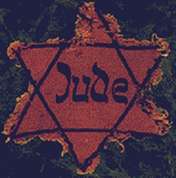D U R S L E Y T A B E R N A C L E
© 2005 Dursley Tabernacle United Reformed Church

This page is a copy of the presentation given by Mathew Barton about his trip to visit Auschwitz. Mathew gave this presentation in the Tab on Remembrance Sunday.
Auschwitz Remembrance
As many of you may know, I visited the concentration camps of Auschwitz and Birkenau in Poland on the 19th October. What I saw there is easy to explain physically – I saw crematoria. I saw barracks. I saw cells. I saw gallows. I saw gas chambers. You will see this in the photos I took. And yet it is not easy to explain what I saw emotionally. I did not feel as sad as I expected – more a sense of numbness and utter disbelief that people could be subjected to such a thing on such an unprecedented scale – the human mind is incapable of identifying with so many millions of people.
In Auschwitz, the smaller of two camps converted from an ex-Polish army barracks and now a state museum, what you see is what affects you, in the exhibits within each block. In Birkenau, the hub of the Nazi Final Solution, it is what you do not see that affects you the most – the emptiness, the sh eer, vast, emptiness of the place – an emptiness that I sensed went beyond the physical. You may have heard it said that the birds do not sing at Auschwitz. You may have thought such a remark flippant and melodramatic. I tell you, the birds do not sing at Auschwitz. Not a single one.
I will show you some photographs of Auschwitz and Birkenau, and try and take you through my journey that day:
I took my camera with me; I was not sure if I wanted to take photographs. This glass cabinet, about 30 or 40 feet wide, was full of human hair that had been shaved from new arrivals. This sight made me feel that I had to take a picture.
Another cabinet, full of spectacles. Just think of how many people those spectacles represent. And then remember that is a miniscule sample.
Another huge cabinet of prosthetic limbs and walking aids. Fewer people have these than have spectacles, and yet here is a cabinet full of them again. Think of all the people those limbs and aids belonged to.
Suitcases: the SS guards told deportees to clearly mark all their luggage so it could be sorted properly – such luggage was emptied of valuables and left in a warehouse, forgotten about.
On both sides of this man, stretching ahead and behind of him, were cabinets full of shoes. Just the small sample of shoes that were on display represented, by my estimate, tens of thousands of people, if not a hundred thousand.
And now we move outside – look at this view. It looks almost beautiful, doesn’t it, with the sun shining through the trees.
And at the end of the path, drenched in sunlight through the trees, stands a reminder of the barracks’ history – a guard tower continually occupied by a guard.